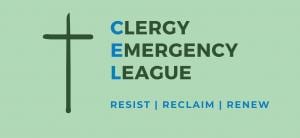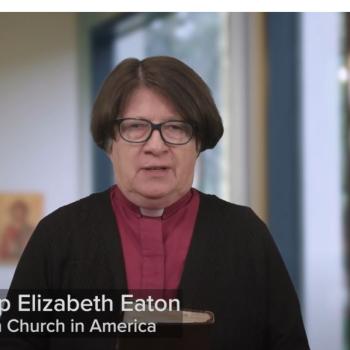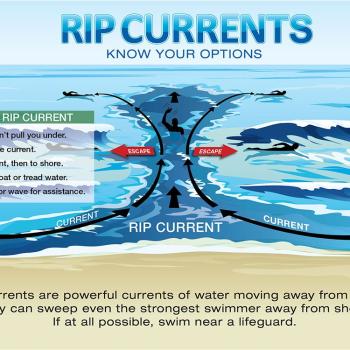Many are feeling anxious from the 2024 election and what lies ahead. Here are 20 things clergy and congregations can to do prepare for 2025.

How clergy and congregations can prepare for 2025
A group I co-founded called the Clergy Emergency League has complied a list of ways that ministers and congregations can prepare for 2025 and protect their communities, including things that should be stock-piled.
You can download the list for free here.
Special thanks to LaVinnia Pierson, a member of the CEL Steering Committee, for spearheading this project and gathering the information.
Prepare for 2025 now
When we face times of uncertainty, it is sometimes helpful to know what we can do to prepare. We can maintain resilience when we take actions which will minimize feelings of despair and helplessness.
Here are some ways that clergy and congregations can work toward harm reduction and protecting ourselves and others in the coming months. These suggestions are based on the things that the incoming administration has said it intends to do, including threats of deportations, high tariffs, and deregulation.
Within this list are concrete action items for individuals, communities, clergy, and congregations to do before the new administration begins. Taking steps now will prepare us for what is to come.
Put on your “oxygen mask”
As with the instructions on an airplane before take-off, we must put on our own oxygen mask before helping others. So taking these steps for ourselves and our communities will give us the ability to care for others when the time comes.
Keep in mind, these are only suggestions. Each person and community will have their own ideas of what is needed based on their contexts and unique needs.
20 points of preparation
Here are 20 points to consider for preparations now before the new administration comes to power, including financial, food and supplies, medical and health, and self-care.
[What should immigrant congregations do? The Clergy Emergency League is meeting about exactly that issue in December and will be hosting a public webinar in January. Stay tuned!]
Financial
- If you have financial assets, protect what you have, sell stock while it is high, diversify your assets.
- FDIC protection may not be available, so review your bank accounts.
- Stockpile cash on hand and place in different secure and hidden places in house, office, etc.
- If your financial options are limited or you live below the poverty line, seek out mutual aid societies in your community. Build connections now before the administration begins.
- If you have investments, avoid investing in companies building for-profit prisons that will benefit from immigrant round-ups and incarcerations.
- Purchase needed items now that may be difficult to afford or to obtain in the future. With tariffs and deportations, supply chains will become interrupted again.
- New tires, new car, new appliances, lumber for home repairs, any large items or tech items that are made overseas.
- Extra fuel such as gasoline, propane, and kerosene.
- Also consider any needed car repairs or costly home repairs. Parts and supplies may be expensive or difficult to get.
- If you don’t have the financial means to purchase items, create a bartering circle with people you trust so that you can rely on each other for the use of items you’ll need.
Food and other supplies
- Massive deportation, tariffs, and deregulation will affect food supply and quality. Blue states are making plans to prevent this, but we don’t know how this will play out. California is the 5th biggest economy in the world, with over 25% of the country’s produce, plus meat, cheese, eggs, fish and seafood, so it’s uncertain how these items might be available or affected by deregulation and deportations. Also, consider that the FDA, NIH, and other departments are targeted for weakening and eventual elimination.
- Stock up now on items you use regularly, such as non-perishables and items you can freeze. Check expiration or best buy dates, and look for the latest date possible.
- See the end of our online preparation guide that lists foods from other countries.
- Shelf stable foods like flour, sugar, oatmeal, rice, dry beans, pasta, peanut butter, powdered milk, dried fruit, canned fruits and vegetables, canned meats, tuna, spices, herbs, bottled seasonings
- Frozen foods like meats, frozen vegetables, and fruits
- Fresh fruit that will hold well, like citrus or apples
- Specialty food items, such as gluten free flour (rice based), dairy free items, and other foods free from allergens
- Water, as well as a water purifier and purification tablets (Aqua tabs), often sold at places like REI.
- Soaps: Hand soap, dish soap, laundry soap, cleaning supplies, bleach, hand sanitizer
- Paper products: Toilet paper, paper towels, tissues
- Pet food and other pet supplies, including treats, litter, toys, etc.
- Plastic bags, foil, garbage bags (many made in China)
- Office supplies, paper, pens, tape, sharpies
- Home supplies, such as light bulbs and batteries (often made in China)
- Sewing supplies (watch YouTube videos for how to repair clothing or find a “sewing mentor”)
- Tools, including portable tools like a Swiss army knife or utility knife
- Garden seeds for home and community gardens
- Support local food sources such as farmers markets, and turn to local farm supplies for eggs, honey, and produce
- Support local farmers markets and local small businesses in this time of transition. Get to know the farmers who will need our support.
Medical and Health
- Deregulation and elimination of the Affordable Care Act may affect medication availability and cost.
- Attend to medical supplies including prescription medications, over the counter medication you use regularly, other items that will be difficult to obtain in the future (contraception, morning after pill, etc.) Don’t count on insurance for medical supplies such as wheelchairs or walkers
- Other items: first aid supplies, toothpaste, feminine hygiene and menstrual products, diapers, diaper wipes, adult diapers, disposable gloves, masks (useful in areas of wildfires, as well as for airborne viruses such as Covid and bird flu)
- Get any needed vaccines now, especially flu and Covid.
- Make medical appointments for routine preventative care such as mammograms, colonoscopy, dental, eye and any other appointments
- Those who have a menstrual cycle should consider deleting period trackers
- Those at risk of becoming pregnant should consider either stocking up on birth control pills or seek long-term or even permanent forms of birth control (IUD, tubal ligation) and schedule these procedures before Jan. 20.
Other ideas to build community and community safety
- Churches can use their libraries to retain any books that may be banned or difficult to get, including history books. Reading clubs and book groups may find it helpful to have a curated list of books.
- Churches with schools or other ministries should look at stocking up on the above items for their ministries.
- Renew passports, have an extra copy of birth certificates, have designated meeting places planned (important for vulnerable populations), designate safe people.
- Make emergency “Go bags” in case of a need to evacuate quickly. (See our online list for suggestions.) This is important for anyone in fire, flood, hurricane, or earthquake areas, or for vulnerable people. The weather service may not be helpful. GPS may not be reliable, so purchase U.S. map books for driving directions and navigation.
- Churches and community groups can start community gardens, stock food and clothing pantries, offer cooking classes, gardening classes or other workshops.
- LGBTQIA: Protect relationships, get married while possible, update legal documents to protect family members, know phone numbers, know how to find legal aid. If in a red state, consider options for moving to a blue state or even out of the country if marriage equality is rescinded.
- For those who live in red states and are in threatened populations (LGBTQIA, immigrants, people of color, etc.), consider making a plan for moving to a blue state, or even out of the country if necessary.
- Get house appraised and make any necessary updates, repairs, etc., in case you need to sell quickly. Secure your home with a security system, updated locks, motion activated lights.
- Make a list of the local mutual aid groups closest to you. If there isn’t one, learn how to start a mutual aid society with local churches and other community assistance organizations.
- Consider your communication networks and where to find accurate news. News blackouts may come. Seek reliable news sources. So far it seems that BBC and NPR are reliable. In addition, blogs such as those by Heather Cox Richardson and Jay Kuo are sources of factually accurate and unbiased political news. If NOAA is eliminated, sources on weather and impending weather risks will be critical. [For a comprehensive list of news and commentary see: Trustworthy News and Analysis, Current Events Commentary, and Faith Perspectives on Democracy and Politics compiled by the Clergy Emergency League.]
- Seek secure websites and safe sources of communication that utilize end-to-end encryption. Know who you can trust with your private information.
- You don’t have to open your doors to anyone, or answer questions regarding people you work with or know in your community. As Timothy Snyder advises in his book, On Tyranny: Don’t obey in advance. Know your rights and the Constitution.
- Get to know your community, build relationships through smiles and connections. Know who you can trust and rely on. Distance yourself from those who cannot be trusted with your personal information.
Take care of you, and live your values
- Practice self care: Breathe, enjoy nature, eat healthy, get enough sleep, find stress management skills, build a safe community, don’t compromise your values.
- Find joy in everyday life, dance, make music, sing, find community. Joy and hope are acts of resistance!
In our list of Preparations for Clergy and Congregations Protecting People in 2025, you’ll also find the following:
- Emergency Kit Suggestions
- Evacuation Grab-and-Go lists for 5-minute, 15-minute, 30-minute, and 1-hour times
- Food Items that may be affected by Tariffs
Download the list for free here.
Of course, this list is not exhaustive. If you have suggestions, please add them in the comments below.
We hope this list will be a helpful place to start for clergy and congregations to prepare for 2025.
Again, thank you to LaVinnia Pierson, a member of the CEL Steering Committee, for spearheading this project and gathering the information.

If you are a clergy person who is looking to connect with other Christian leaders in this work of resisting and disrupting Christian nationalism, check out the Clergy Emergency League, a group I co-founded in 2020.
[What should immigrant congregations do to prepare for 2025? The Clergy Emergency League is meeting about exactly that issue in December and will be hosting a public webinar in January. Stay tuned!]
Read also:
4 Faithful Post-Election Messages for Clergy & Congregations
Should I Stay or Go? Post-Election Clergy Soul-Searching
Why Did God Allow This to Happen? Post-election Theodicy

The Rev. Dr. Leah D. Schade is the Associate Professor of Preaching and Worship at Lexington Theological Seminary in Kentucky and ordained in the ELCA. Dr. Schade does not speak for LTS or the ELCA; her opinions are her own. She is the author of Preaching and Social Issues: Tools and Tactics for Empowering Your Prophetic Voice (Rowman & Littlefield, 2024), Preaching in the Purple Zone: Ministry in the Red-Blue Divide (Rowman & Littlefield, 2019) and Creation-Crisis Preaching: Ecology, Theology, and the Pulpit (Chalice Press, 2015). She is the co-editor of Rooted and Rising: Voices of Courage in a Time of Climate Crisis (Rowman & Littlefield, 2019). Her book, Introduction to Preaching: Scripture, Theology, and Sermon Preparation, was co-authored with Jerry L. Sumney and Emily Askew (Rowman & Littlefield, 2023).













